Canada to Build Oil Pipeline to Serve Asia
MONTREAL -- Canada is scrambling to build an expansive new oil pipeline network to reach new markets including Asia as its sole customer, the United States, hikes production, aiming to become the world's top exporter.
Canada holds the third-largest oil reserves in the world but 98% of its oil exports and 100% of its natural gas shipments go the United States. This has made Canada the top energy supplier to its neighbor.
But that could soon end.
The United States is seeing a boom in shale gas and offshore oil production as it strives for energy independence, and the International Energy Agency recently said the U.S. could become the world's top oil producer by 2020.
This week, Canada's Natural Resources Minister Joe Oliver urged a fix: build more pipelines to move oil from landlocked Alberta province to both refineries in eastern Canada and the Pacific coast to fill tankers bound for Asia.
"The U.S. market will not be large enough to accommodate all of Canada's oil exports," Oliver said.
"By 2035, Canadian oil exports will be 4 million barrels per day, but total US imports will only be 3.4 million barrels per day. This highlights the need for Canada to access new markets," Oliver added.
The federal government has put its weight behind several new pipeline projects, but the initiatives face stiff opposition from environmentalists and regional authorities.
"We're already lacking outlets for the oil now being produced -- existing pipelines are at capacity," said Marco Navarro-Genie, a researcher at Calgary-based Frontier Centre for Public Policy.
"We're forced to sell our oil at $22 below market value because we can't get it to any market outside of North America," Navarro-Genie said.
A New Course
The first major push to brighten the Canadian oil industry's outlook was a proposal to build the Keystone XL pipeline to carry 830,000 barrels of oil per day from the Alberta oil sands to refineries and ports on the US Gulf Coast.
President Barack Obama denied approval for part of the US$7 billion pipeline earlier this year, while the U.S. State Department asked for a new proposed route to avoid environmentally sensitive areas.
A southern leg of TransCanada Corporation's pipeline was later approved but the northern portion still needs State Department approval because it crosses the border.
TransCanada submitted a new route for that section in September, and has said it expects a decision in early 2013.
Andre Plourde, an oil specialist at Carleton University in Ottawa, noted that refineries in the Houston, Texas area largely handle heavy crude oil, and are seeing dwindling supplies from key producers in Venezuela and Mexico.
This presents an opportunity for Alberta, which also produces heavy oil, he said.
While conventional light crude oil is pumped from the ground, oil sands must be mined and bitumen separated from the sand and water, then upgraded and refined.
Once it reaches the U.S. Gulf Coast, the oil may be sold in the United States or shipped abroad.
The International Energy Agency forecasts that global energy demand will rise by one-third by 2035, spurred by rising economic activity in China, India and the Middle East.
Canada is eyeing those markets. Two new pipelines connecting the oil sands to the Pacific coast for eventual shipping to Asia are currently under review.
Enbridge's Northern Gateway pipeline, the more controversial of the pair, faces stiff opposition from environmental activists, officials in the westernmost province of British Columbia and local aboriginals.
It would transport oil across nearly 750 miles of rugged mountain landscapes to Kitimat on British Columbia's northern coast.
Aboriginals and environmentalists say bustling tanker traffic poses risks to the pristine coastline that includes salmon-bearing rivers and the habitat of a rare white bear.
So British Columbia is demanding a "fair share" of oil revenues to reflect the environmental risks the province faces -- a request Alberta, home to Canada's oil sands, has so far refused.
Enbridge and TransCanada most recently also touted a conversion of an underutilized natural gas pipeline and reversing the flow of another existing oil pipeline to carry oil from western Canada to refineries in eastern Quebec and New Brunswick provinces.
Oliver said his government is "supportive of proposals for pipelines to transport Canadian oil west, south and east."
And if those fail, others have proposed shipping oil through Arctic ports such as Churchill, Manitoba.
Jacques Lemieux, AFP
Copyright Agence France-Presse, 2012
About the Author
Agence France-Presse
Copyright Agence France-Presse, 2002-2025. AFP text, photos, graphics and logos shall not be reproduced, published, broadcast, rewritten for broadcast or publication or redistributed directly or indirectly in any medium. AFP shall not be held liable for any delays, inaccuracies, errors or omissions in any AFP content, or for any actions taken in consequence.
